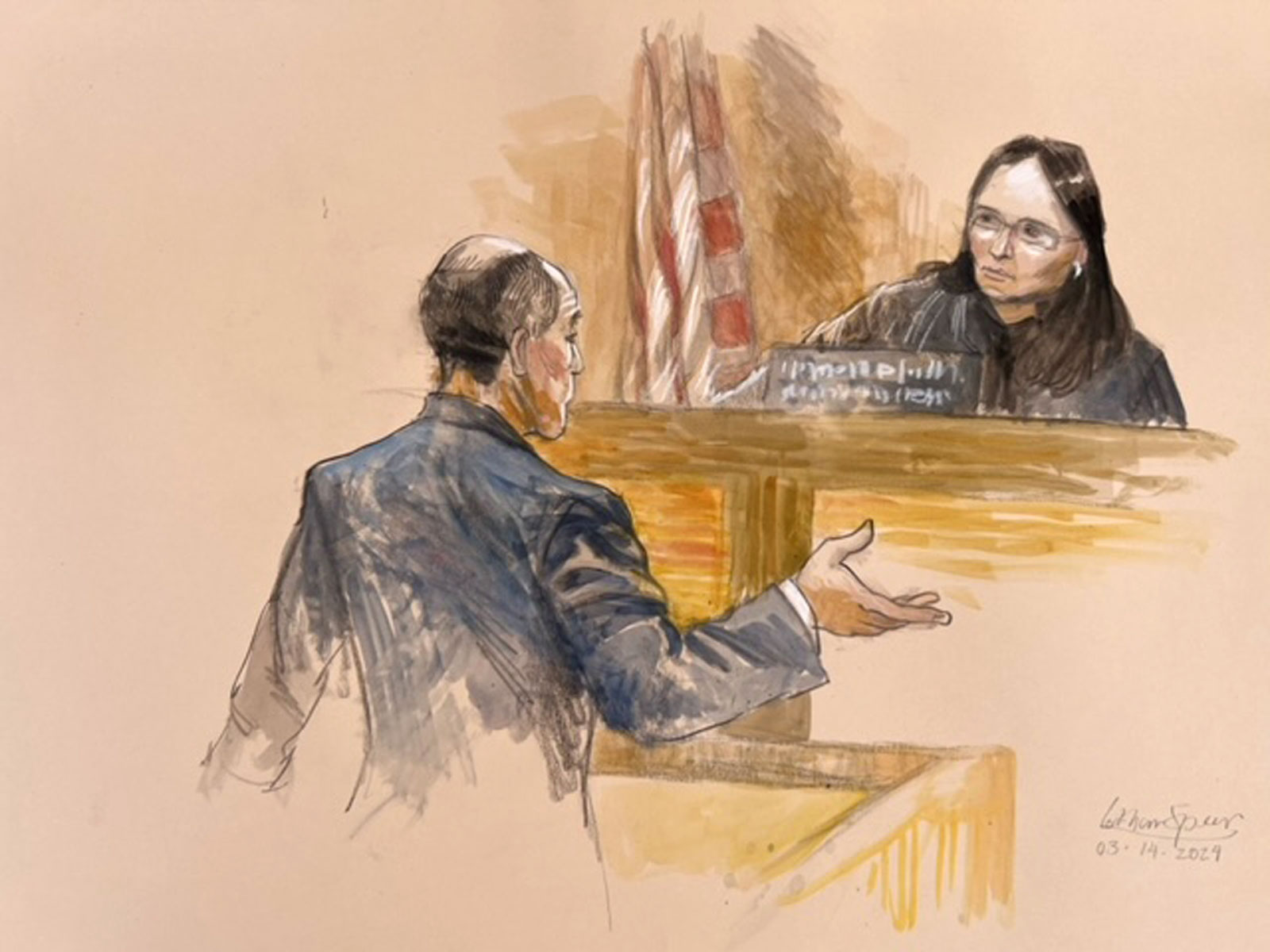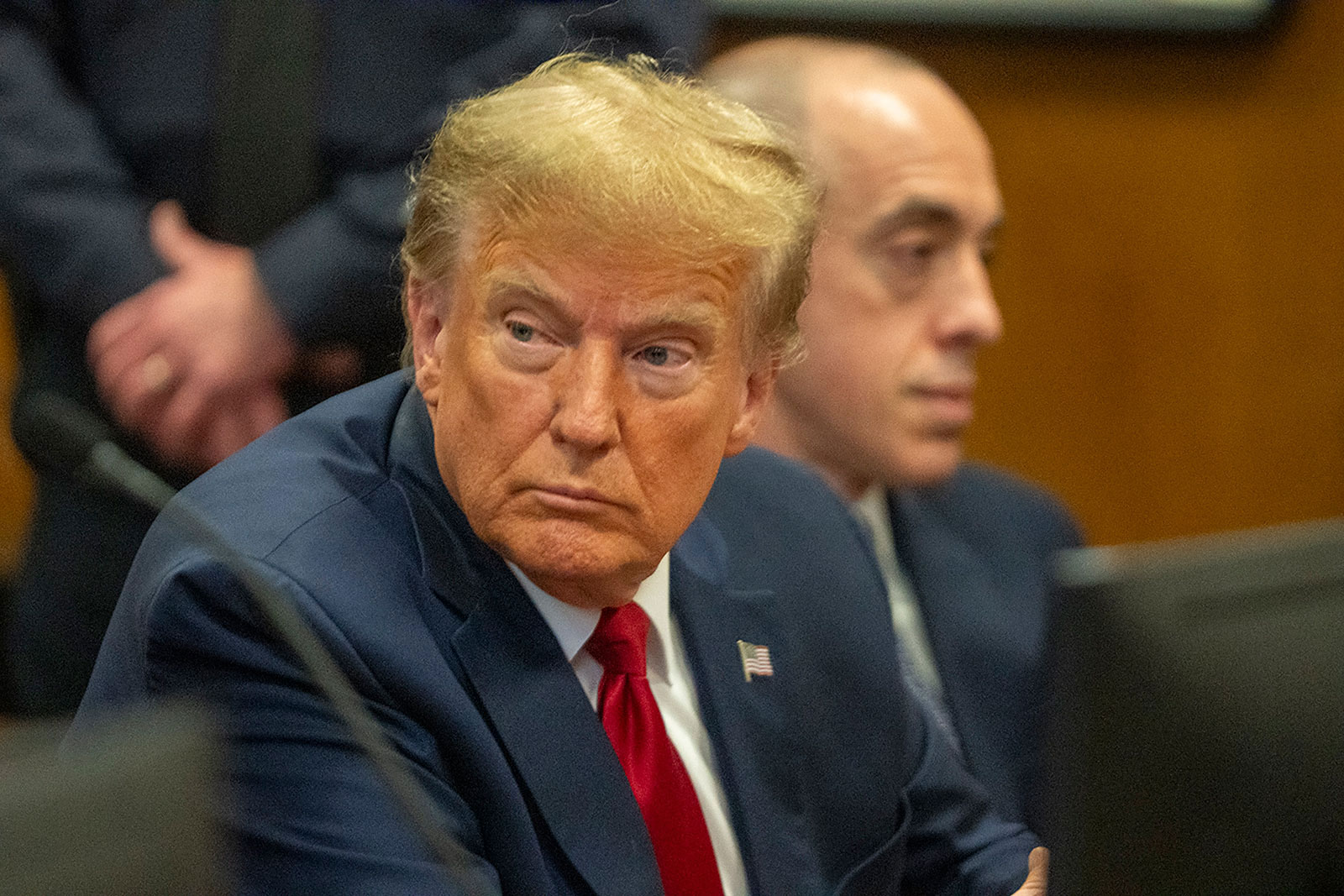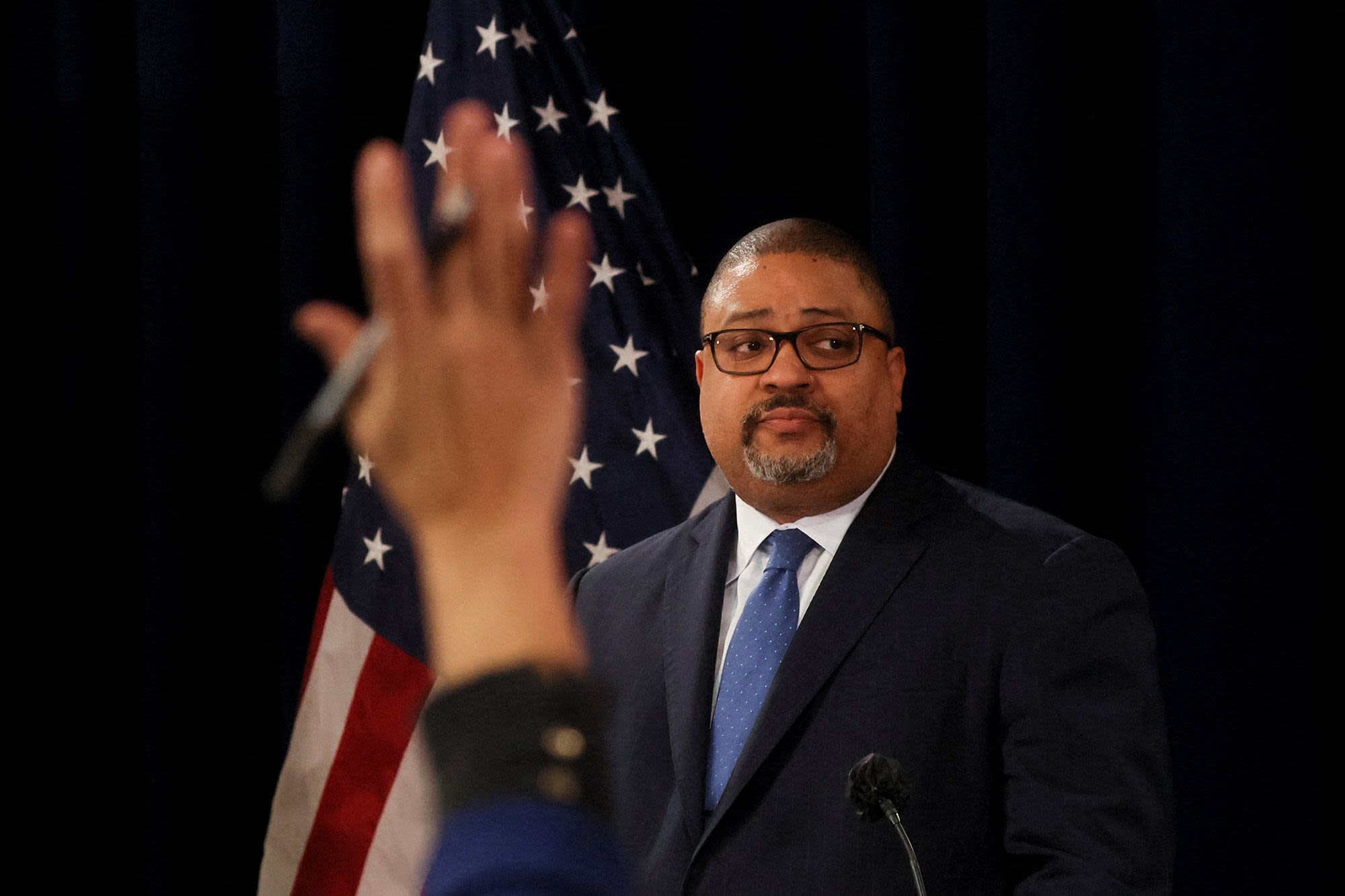Our coverage for the day has ended. Follow the latest on the classified documents case here.
March 14 - Trump classified documents case updates
By Dan Berman and Elise Hammond, CNN
Judge denies one of Trump’s motions to dismiss charges in classified docs case
From CNN’s Holmes Lybrand

The judge presiding over the classified documents case in Florida denied Donald Trump’s motion to dismiss charges based on unconstitutional vagueness.
Just hours before her ruling, Judge Aileen Cannon heard arguments in a Fort Pierce courtroom over Trump’s motion, where his attorneys said the law that prosecutors used to charge him for allegedly retaining national defense records without authorization was too vague to be used against him.
“Although the Motion raises various arguments warranting serious consideration, the Court ultimately determines, following lengthy oral argument, that resolution of the overall question presented depends too greatly on contested instructional questions about still-fluctuating definitions of statutory terms/phrases as charged,” Cannon wrote.
Cannon noted in her denial that the issue of the potential vagueness of the statue would be better brought “with jury-instruction briefing and/or other appropriate motions” instead of in Trump’s motion to dismiss charges.
Cannon has not ruled on Trump’s motion to dismiss based on his argument that he had the authority as president to declare documents as his “personal” records – or on any of his other motions to dismiss the case.
Key takeaways from today's hearing on Trump’s attempt to dismiss the classified documents charges
From CNN's Tierney Sneed and Hannah Rabinowitz
US District Court Judge Aileen Cannon on Thursday declined to toss out the classified documents case against Donald Trump after hours-long arguments in part over whether the charges against the former president were too vague.
Before the judge were two of the nine motions to dismiss that the defendants have filed in the case. Cannon first heard Trump’s claim that the law prosecutors used to charge him for allegedly retaining national defense records without authorization was too vague to be used against him. Fewer than three hours after the hearing, Cannon rejected that claim.
Trump’s second motion argued that the Presidential Records Act – which governs how White House records are handled by an outgoing administration – required that the case be thrown out. Cannon hasn’t yet ruled on the second claim.
The judge, however, expressed skepticism during the hearing toward both requests for the charges to be dismissed, and she suggested that some of the issues the Trump legal team was raising would be better left to a jury to consider.
Here are key takeaways from Thursday’s hearing:
Throwing out charges because law was vague would be ‘extraordinary,’ judge says: The morning session was focused on Trump’s ultimately rejected argument that the law prohibiting the unlawful retention of national defense information was too ambiguous to be applied to his alleged conduct. Cannon said it would be an “extraordinary step” for her to throw out those charges on the basis that they were unconstitutionally vague.
Cannon: Trump’s arguments would "gut" the Presidential Records Act: The judge was similarly skeptical of the second Trump request being argued Thursday: that, because he has supposedly unlimited power to decide which documents from his White House were personal, the case against him should be dismissed. Cannon said that Trump’s lawyers were making some “forceful” arguments his ability to designate the records as personal by taking them to his Mar-a-Lago resort at the end of his presidency.
Cannon said some of Trump’s concerns should be up to the jury: The judge repeatedly said Thursday that some of Trump’s arguments are best suited for a jury to decide during his eventual trial. On multiple occasions, Cannon pushed Trump’s attorneys over whether their arguments – specifically that Trump didn’t know he was breaking the law when he took documents to Mar-a-Lago – were “premature.” Cannon said, however, that the arguments could be a “forceful” trial defense, signaling she is sympathetic to some of the former president’s complaints about the criminal case.
Read up on more takeaways from the Florida hearing.
Here's a recap of the 4 criminal cases Trump faces
From CNN's Devan Cole

Lawyers for Donald Trump were in court today, arguing that the criminal case concerning the former president's handling of classified documents should be dismissed.
It is one of four criminal cases Trump faces, while he also juggles being the Republican presumptive nominee for president. The former president is now facing 88 charges over the four criminal indictments in Georgia, New York, Washington, DC, and Florida. Trump has pleaded not guilty to every charge in these cases.
Here's a recap of each case and where things stand:
- Classified documents: The case centers around Trump’s resistance to the government’s attempts to retrieve the materials he took to Mar-a-Lago from the White House. The National Archives said in early 2022 that at least 15 boxes of White House records were recovered from the estate, including some that were classified. The charges were brought by special counsel Jack Smith.
- Federal election interference: Smith separately charged the former president last August with four crimes over his efforts to reverse the 2020 election results. That case is currently on hold as the Supreme Court weighs Trump’s claims of presidential immunity in the matter. The justices will hear oral arguments in the case next month.
- Fulton County: State prosecutors in Georgia brought a similar election subversion case against Trump and others. A trial date has not yet been set in that case, which is also in limbo while Trump and several of his co-defendants try to disqualify the Atlanta-area district attorney who brought the charges.
- Hush money: The former president’s first criminal trial is scheduled to take place later this month in New York, where he faces state charges stemming from his alleged falsification of business records with the intent to conceal illegal conduct connected to his 2016 presidential campaign.
Read more about the four criminal cases Trump faces.
New York prosecutors tell judge they’re willing to delay Trump's hush money trial until late April
From CNN's Lauren del Valle and Jeremy Herb

In a separate case that Donald Trump is facing, the Manhattan District Attorney’s Office said it is willing to delay the former president's criminal hush money trial for up to 30 days, according to a court filing.
The trial is currently scheduled to start on March 25. The potential delay throws the date for what’s supposed to be the former president’s first criminal trial into question, a surprise twist that represents a major boost for Trump – whose defense teams have employed a strategy of consistently trying to delay all of his trials past the election.
Trump is facing criminal charges in four distinct cases, but until Thursday, the New York case was the only one with a clear trial date. The federal election subversion case is on hold until the Supreme Court hears Trump’s immunity claims next month, while Trump’s lawyers are pushing to delay his classified documents mishandling trial in Florida until August or even beyond the election.
And in Georgia, a judge is set to rule within days on whether to disqualify the Fulton County district attorney who is prosecuting the former president over his alleged efforts to overturn the 2020 election there, which could throw that entire case into doubt.
More about the New York case: Trump was charged by the District Attorney Alvin Bragg’s office last year with 34 counts of falsifying business records. The charges stem from reimbursements made to Trump’s former lawyer Michael Cohen for hush money payments he made before the 2016 election to an adult film star alleging an affair with Trump. The former president has pleaded not guilty and denied the affair.
The proposed delay in the New York trial is in order to give Trump’s lawyers time to review new materials turned over by federal prosecutors this week, the DA’s office said.
The Presidential Records Act came up repeatedly in today's hearing. Here's what it says
From CNN's Daniel Dale
Lawyers for Donald Trump are pushing a series of arguments for why the judge overseeing the case concerning the former president's handling of classified documents should order the case to be dismissed. Some of those arguments include that Trump is shielded by presidential immunity and that his handling of classified material is allowed under the Presidential Records Act.
What the Presidential Records Act says: The key sentence is, “Upon the conclusion of a President’s term of office, or if a President serves consecutive terms upon the conclusion of the last term, the Archivist of the United States shall assume responsibility for the custody, control, and preservation of, and access to, the Presidential records of that President.”
One section of the law lays out a process of communication between a sitting president and NARA’s chief archivist for instances in which the president wants to dispose of personal records, which are defined as records of “a purely private or nonpublic character” unrelated to the president’s official duties.
Another section of the law allows a president, before leaving office, to restrict access to some records (including personnel files and medical files, advice from aides, trade secrets and certain defense information) for up to 12 years — though these records must still be in NARA custody during the temporary restricted period.
Neither of these sections of the act is relevant to Trump’s case because:
- Trump was an ex-president
- He possessed indisputably official records
- Those official records were on his own property, outside of NARA custody
- He did not return these records even upon repeated NARA requests and a Justice Department subpoena
Prosecutors argue that classified documents found in Trump's resort were "nowhere near personal"
From CNN’s Tierney Sneed, Hannah Rabinowitz, Mei-Ling Mijares, Katelyn Polantz and Holmes Lybrand
David Harbach, a prosecutor with the special counsel, argued in court that the classified information found at Donald Trump's Mar-a-Lago residence were “nowhere near personal,” as the former president has claimed.
Pushing back against Trump’s arguments that the Presidential Records Act (PRA) authorized him to keep documents after leaving the White House, Harbach said that the law doesn’t give presidents “carte blanche” to improperly designate records as personal.
It would be “absurd,” Harbach said, if the National Archives couldn’t seek the Justice Department’s help after finding a “boatload” of classified records in boxes returned from Mar-a-Lago, which raised concern more classified material remained at the Florida estate. The FBI later searched Trump’s Mar-a-Lago residence and found more.
And, Harbach added, even if the records were considered his personal documents under the PRA, as Trump has argued, the PRA “says zero, zip on classified information.”
Former presidents shouldn’t have a “permanent exemption for all time” to classification rules, Harbach said.
Judge says she’ll rule "promptly" on some of Trump’s motions to dismiss charges in classified docs case
From CNN's Tierney Sneed
Judge Aileen Cannon wrapped up the hearing Thursday without a ruling on two of Donald Trump’s motions to dismiss the classified documents case against him.
The federal judge said from the bench in Florida that she would take the motions "under advisement" and would be ruling on the two motions "promptly."
There are nine total motions to dismiss, and Cannon has not set additional hearings on any of the other motions to dismiss.
Judge Cannon skeptical of Trump citing past presidential authority to dismiss charges
From CNN’s Tierney Sneed, Hannah Rabinowitz, Mei-Ling Mijares, Katelyn Polantz and Holmes Lybrand

Judge Aileen Cannon expressed skepticism toward former President Donald Trump's argument that the classified documents case should be dismissed under the Presidential Records Act (PRA), which Trump has claimed allowed him to make the documents his personal papers.
"It's difficult to see how this gets you to the dismissal of an indictment," the judge told Trump's attorney Thursday afternoon.
Cannon showed some openness to the idea that Trump had the power to designate the records as personal and take them to Mar-a-Lago at the end of his presidency. She said that argument was "forceful" but suggested it was a question for a jury to consider during trial.
"Your arguments might have some force, again, as it comes to a trial defense," Cannon said, referring to arguments from Trump’s attorneys that other executives have retained presidential documents.
But, Cannon said, the defense’s arguments would effectively "gut the PRA altogether" and allow future presidents to say clearly presidential documents are personal — an argument the Justice Department has made in court papers in the case.
Cannon has now expressed skepticism about both of Trump’s two motions to dismiss that are being discussed Thursday.